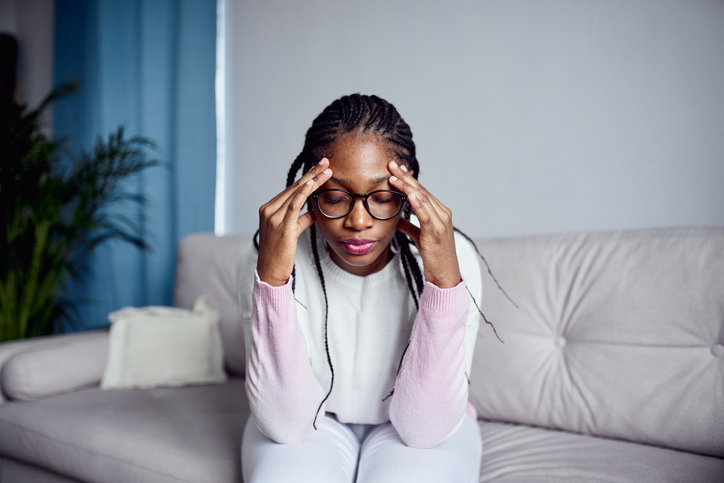Managing Stress And Anxiety Around Election Day
Source: Ekaterina Goncharova / Getty
Reducing stress and anxiety before election day can be important for maintaining mental well-being. According to a new survey posted by the American Psychological Association (APA) this month, people across the U.S. are feeling anxious about the upcoming Nov. 5 election and its potential outcome.
The APA found that over 70% of adults (77%) identified the future of the nation as a major source of stress, making it the leading concern in this year’s survey. The economy followed closely, with 73% citing it as a significant stressor. The upcoming 2024 U.S. presidential election ranked third, affecting 69% of adults. This marks a slight increase in election-related stress compared to 2020 (69% vs. 68%), and a notable rise from 2016, when former President Donald Trump stepped into the White House (52%).
Other significant stressors included health care (55%), violence and crime (54%), the environment (51%), global tensions (51%), and gun laws (49%). When asked about specific news topics, many adults reported feeling stressed about housing costs (65%), mass shootings (63%), misinformation (62%), and societal division (60%).
The survey also revealed deep concerns about the potential consequences of the election: 72% of adults expressed worry that the results could lead to violence, and 56% feared that the 2024 presidential election might signify the end of democracy in the U.S.
If you’re feeling anxious about the upcoming election, take a deep breath—it’s going to be okay. Here are some steps you can take to ease your anxiety as election day approaches.
Source: REBECCA NOBLE / Getty
Stay Informed, but Limit News Intake
Keep up with the news, but set boundaries on how much time you spend consuming it. Designate specific times for checking updates to avoid feeling overwhelmed. APA CEO Arthur C. Evans told CBS News, “For election-related stress, being engaged in the political process is an important way to manage our stress. Limiting the amount of information that you’re taking in, particularly when you’re tired, is also another very important coping strategy.”
Practice Mindfulness and Meditation
Techniques like mindfulness, deep breathing, and meditation can help ground you and reduce anxiety. Even a few minutes each day can make a difference. Healthline notes that you can take slow, deep breaths to help calm your mind when anxiety begins to rise. Shift your focus to positive thoughts whenever negativity feels overwhelming. Try counting slowly from one to 10 (or higher) until you feel your anxiety subsiding. Find something that makes you laugh or brings you joy, and immerse yourself in that feeling until your anxiety lessens. You can also engage in physical activity. Exercise is a great stress reliever. Whether it’s a walk, yoga, or a workout, physical activity can help clear your mind and boost your mood.
Limit Social Media
Social media can amplify stress, especially around election time. Consider taking a break or unfollowing accounts that contribute to your anxiety. In a CBS News interview, psychiatrist Dr. Sue Varma recommended setting timers on social media apps to curb doom-scrolling and establish boundaries for phone notifications.
“It’s really important to have and carve out sacred spaces throughout your day where you don’t have constant notifications,” Dr. Varma shared. “(For) a lot of people — when you’re having conversations, you’re at the dinner table — that the phone is constantly telling you, moment by moment, what’s happening in the news, and that’s really hard to pay attention, to be productive, to be able to connect with family members.”
Connect with others. Talk about your feelings with friends or family. Sharing your thoughts can help alleviate anxiety and foster a sense of community.
Focus on What You Can Control
Concentrate on your own actions, like making a plan for how you’ll vote, rather than getting caught up in uncontrollable external factors. If you’re eligible to vote, make sure you participate! Join voter registration drives to inspire others to make their voices heard at the ballot box, the Counseling Center notes. Consider volunteering for candidates and initiatives that resonate with you, whether they’re local, regional, or national.
You can also become an activist by attending meetings, peaceful protests, marches, and rallies to support the causes that matter to you. Engage in some of your favorite hobbies. You can distract yourself with activities you enjoy, whether it’s reading, crafting, or gardening. Engaging in hobbies can help shift your focus and provide relief.
Practice Self-Care
Prioritize rest, nutrition, and hydration. Make time for activities that make you feel good, whether it’s taking a bath, cooking, or watching a favorite show. Try to reduce your alcohol and caffeine during this stressful time, too. These substances can increase anxiety levels. Alcohol, in particular, affects neurotransmitters in the brain, which can lead to negative feelings like anxiety, Healthline notes. Moderating your intake can help maintain a more balanced mood.
Make a plan for how and when you will vote. Knowing you have a plan can help ease anxiety about the process. Remember, it’s okay to feel anxious—acknowledging your feelings is the first step in managing them.
SEE ALSO:
For Black Women, Healthcare Is Central This Election Cycle
Black People And Seasonal Depression: How To Combat Seasonal Affective Disorder

